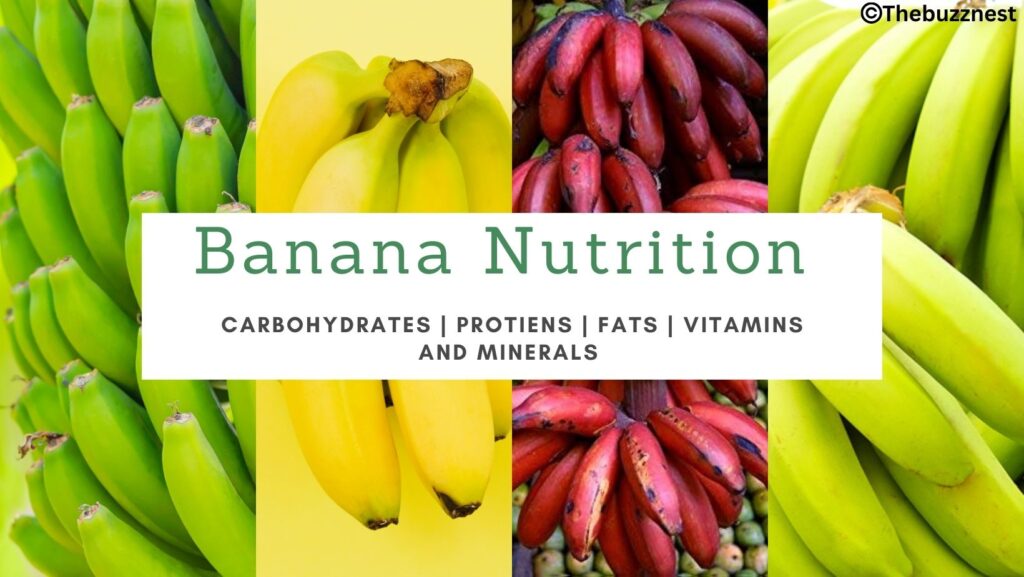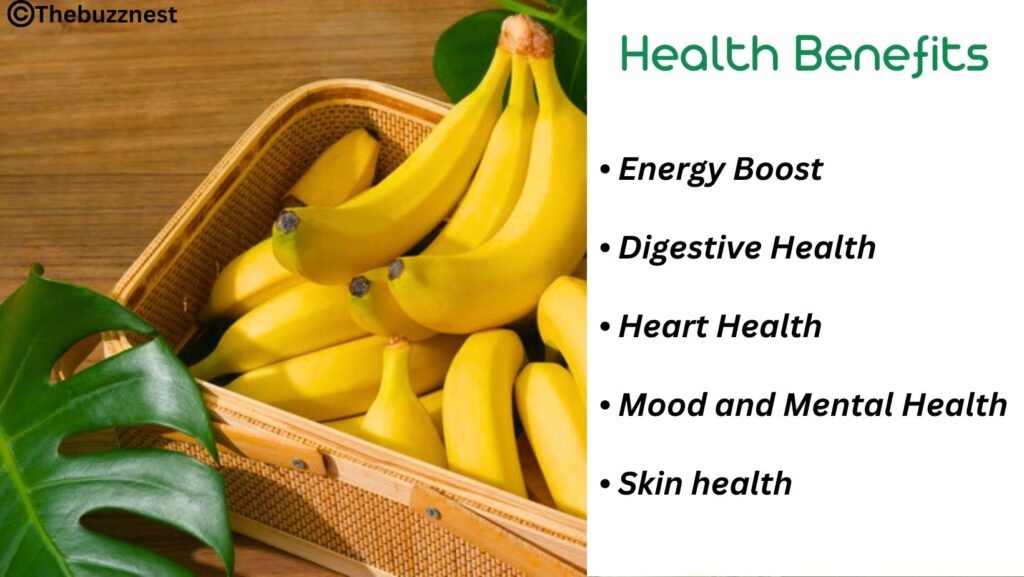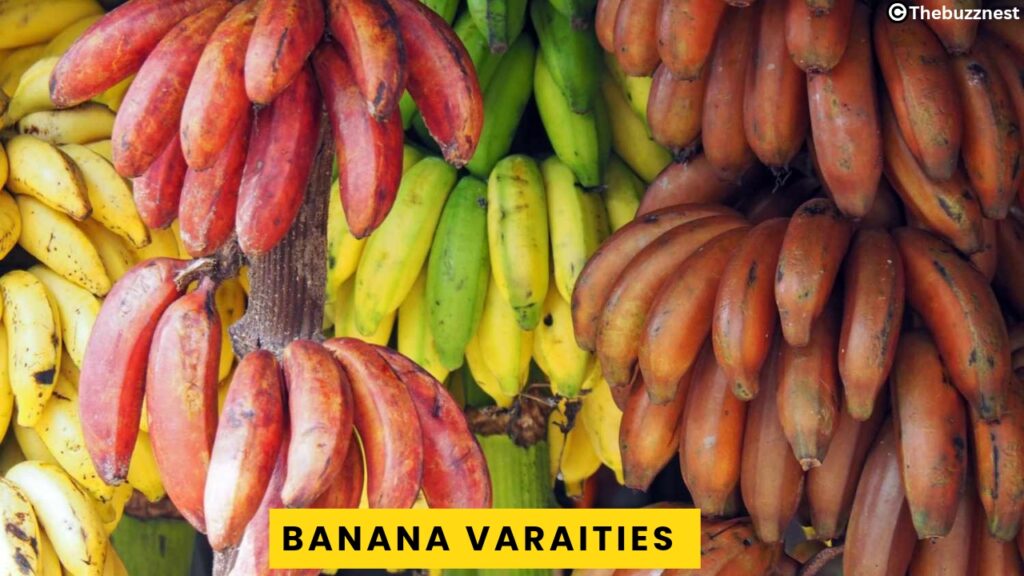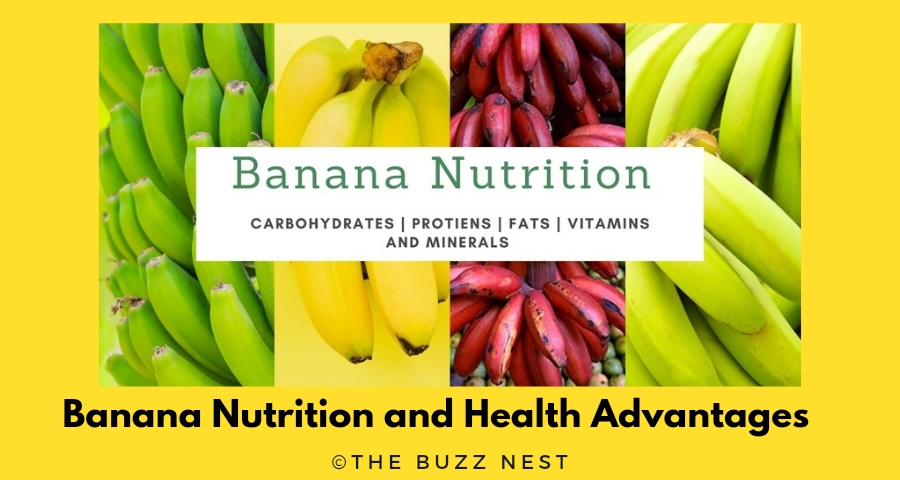Bananas are more than just a convenient, tasty snack; they are a nutrient-dense fruit with a host of health benefits. With their sweet flavor and creamy texture, bananas have earned their place in kitchens worldwide. But beyond their deliciousness, bananas pack a punch with essential nutrients and offer several health benefits. This article explores Banana nutrition, their health benefits, potential allergies, different varieties, and tips for storage and preparation.
Banana Nutrition

Bananas are packed with essential nutrients that support overall health. Here’s a look at banana nutrition:
- Carbohydrates: Bananas are primarily composed of carbohydrates, with a medium-sized banana containing about 27 grams of carbs. These carbohydrates are mainly in the form of natural sugars like glucose, fructose, and sucrose, which provide a quick source of energy. Additionally, bananas contain dietary fiber, which aids digestion and helps maintain steady blood sugar levels.
- Proteins: While not a high-protein food, bananas do provide a small amount of protein. A medium banana contains approximately 1.3 grams of protein, which supports muscle repair and growth.
- Fats: Bananas are very low in fat, with less than 0.5 grams per medium-sized fruit. This makes them a heart-healthy option that fits well into low-fat diets.
- Vitamins and Minerals: Bananas are rich in several essential vitamins and minerals. They are particularly high in vitamin C, which supports immune function and skin health, and vitamin B6, which is crucial for brain health and the formation of red blood cells. Bananas are also an excellent source of potassium, a mineral that helps regulate blood pressure and maintain fluid balance. Additionally, they contain small amounts of magnesium and manganese, which are important for bone health and metabolism.
Health Benefits

Bananas offer numerous health benefits thanks to their rich nutrient profile:
- Energy Boost: The natural sugars in bananas provide a quick and sustained energy boost, making them an excellent choice for a pre- or post-workout snack. The combination of carbohydrates and fiber helps maintain energy levels and prevent fatigue.
- Digestive Health: Bananas are a good source of dietary fiber, particularly pectin, which aids in digestion and helps prevent constipation. The soluble fiber in bananas also supports healthy gut bacteria and improves overall digestive health.
- Heart Health: The high potassium content in bananas is beneficial for heart health. Potassium helps regulate blood pressure by counteracting the effects of sodium, thus reducing the risk of stroke and heart disease. Additionally, the low sodium content of bananas contributes to maintaining healthy blood pressure levels.
- Mood and Mental Health: Bananas contain vitamin B6, which plays a role in synthesizing neurotransmitters such as serotonin and dopamine. These chemicals are involved in mood regulation and may help alleviate symptoms of depression and anxiety.
- Skin Health: The vitamin C and antioxidants in bananas contribute to healthy skin by combating oxidative stress and promoting collagen production. Collagen is essential for maintaining skin elasticity and reducing the appearance of wrinkles.
Understanding apple nutrition is essential for making informed dietary choices. Here is the complete article.
Allergies

We know about Banana nutrition but Banana allergies are relatively rare but can occur. Symptoms of a banana allergy may include itching or swelling of the mouth and throat, hives, or, in severe cases, anaphylaxis. Individuals who are allergic to latex may also experience cross-reactivity with bananas, as both contain similar proteins. If you suspect you have a banana allergy, it is best to consult with a healthcare professional for appropriate testing and guidance.
Varieties of Bananas

There are several varieties of bananas, each with unique characteristics:
- Cavendish: The most common variety, Cavendish bananas are the type you typically find in grocery stores. They have a sweet flavor and smooth texture, ideal for snacking and baking.
- Plantain: Larger and starchier than Cavendish bananas, plantains are often used in savory dishes. They are typically cooked before consumption and have a higher starch content, making them suitable for frying, baking, or boiling.
- Red Banana: Red bananas have a reddish-purple skin and a sweeter, slightly raspberry-like flavor compared to Cavendish bananas. They are often eaten fresh or used in desserts.
- Apple Banana: Also known as Manzano bananas, these are small, with a distinct apple-like flavor. They are sweet and firm, making them great for snacking and adding to fruit salads.
Whether you enjoy them raw, roasted, spicy curry or transformed into creamy cashew butter or milk, this nut is worth adding to your diet. Trust me! Let’s look into cashew nutritional profile.
Storage and How to Prepare
Proper storage and preparation can help you get the most out of your bananas:
- Storage: Bananas should be stored at room temperature, away from direct sunlight. They ripen best at room temperature, and you can speed up the ripening process by placing them in a brown paper bag. Once ripe, bananas can be stored in the refrigerator to extend their shelf life; the skin may turn brown, but the fruit inside will remain fresh. If you have overripe bananas, you can freeze them for later use in smoothies or baking.
- Preparation: Bananas are incredibly versatile and can be enjoyed in various ways. They can be eaten fresh, sliced into cereals or yogurt, blended into smoothies, or used in baking recipes like banana bread or muffins. To prepare a banana for eating, simply peel off the skin and enjoy. For cooking or baking, mash the banana to the desired consistency or slice it as needed.
In conclusion, bananas are a nutrient-rich fruit that offers a range of health benefits. They provide essential vitamins and minerals, support digestive and heart health, and can enhance mood and skin health. With various types and simple storage and preparation methods, bananas are an easy and delicious way to boost your diet. Enjoy them fresh, in recipes, or as part of a balanced meal for their many health benefits.

